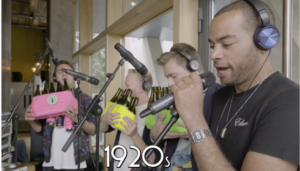Over 29,000 people from 30 European countries took part in the quiz, organised by the consumer movement, Friends of Glass, who wanted to find out about taste preferences and how these are affected by where we live.
Of these people, 1,741 were French and 2,907 were British. The quiz, which ran over a six month period on social media, reveals some surprising connections between the British and the French.
Although beer was cited by the British as the one drink that reminded them of home, they were more likely than the French to unwind with a glass of sparkling wine on a Friday night. Unexpectedly, the French chose a cocktail as their preferred drink to start the weekend.
Jane Peyton, beer sommelier and author, who was recruited as one of the ‘European Friends of Glass TasteMakers’* says: “It’s so interesting to consider what tastes we are naturally drawn to and how much where we grow up influences our preferences or in some cases how our tastebuds evolve over time”.

“The fact that the French love a cocktail on a Friday night is perhaps further evidence of their sweet tooth. More often than not, a cocktail offers a sweeter taste experience. It seems though we have stolen their wine and put it in place of our British beer on a Friday – despite beer reminding us of home!”
Whilst one could attribute the sweet tastebuds of the French to their heritage of fine patisserie, it remains a bit of a mystery why the British like bland food. If we point the finger at plain foods such as meat and two veg, we are forgetting the nation’s rich heritage influenced from many other cultures over the years including the nation’s favourite dish – an overtly spicy one too: curry.
According to other results of the quiz, when participants were asked what they would be if they were a food, the British chose the classic British dish, sausages and mash, and the French opted for a down-to-earth pasta.
Tea remains a staple preferred flavour at the breakfast table in England unlike in France, where they go for coffee. When asked about what they buy in the supermarket, the French are most likely to make a trip for olive oil whereas the British are most likely to buy tomato ketchup.
One thing the French and British do have in common is that they both look out for fresh and natural ingredients in the supermarket.
Rebecca Cocking from Friends of Glass, says: “What’s intriguing are the questions that the quiz raises about British food culture. British cuisine has historically had bad press on the international stage but we know that British food has changed so much over the years that it is now considered to be on a par with other foodie nations. What’s more, it’s made up of many influences from around the world and is anything but bland”.
“We carried out the quiz on different taste patterns in Europe because we wanted to see if there was a connection with previous research that shows consumers consider glass packaging to be the best packaging choice in terms of preserving and not affecting the taste of the food and drink it contains. There is a growing appreciation that glass packaging keeps food fresher for longer without changing its flavour as, unlike other packaging materials, it does not need a chemical layer to protect what is inside.”

The findings about French and British tastes are part of a bigger pan-European project taking place in several European countries, and which will culminate in the production of a ‘Taste Map’ – a fascinating picture of the taste preferences across Europe. The map is available to view athttp://www.friendsofglass.com/tastemap
A HISTORY OF BRITISH TASTE: THE MYSTERY OF ‘BLAND’**
1. Brits have been smoking foods since the Danes and the Vikings brought us smokingtechniques. Kippers and York Ham are classic examples of smoking today and both areanything but bland.
2. Spices have been a part of British cuisine for many years. Britain’s colonial days in India have led to the nation’s obsession with curry and spicy sauces, which are now as popular as traditional dishes such as Roast Beef and Yorkshire Pudding
3. In the middle ages, wealthy people were able to cook with spices and dried fruits from asfar away as Asia
4. The invasion of Franco-Normans brought numerous spices to our isle including mace,nutmeg, pepper and ginger
5. If looking for an origin of ‘bland’, then perhaps the start of bland can be found during the Second World War, when rationing led to food of the most basic ingredients – meat, sugar, butter and eggs – and this continued into the 1950s. It is perhaps from these years that England not only developed a reputation for poor quality food but may also have led to the findings of today’s quiz of the British Bland tastebud…the jury, however, is still out!
For further information contact:
Amanda Barry- Hirst at Third Rock Communications on 07860 313576/01854 612248 or
amanda@thirdrockcomms.co.uk
Debra Pieri at Third Rock Communications on 07801 545462 or debrap@thirdrockcomms.co.uk
Notes to editors
The overall taste for each country was based on an algorithm that took into account specific answers for subsequent questions. Only questions regarding taste or flavour were given weight in the calculation of the algorithm (for example, questions on shopping habits were a weight of zero in the calculation of taste).
Friends of Glass is an influential European consumer forum that supports and promotes the right of consumers everywhere to choose food and drink products in glass packaging. It unites all those who believe glass is the clear choice for taste preservation, personal health and the environment. Friends of Glass was initiated in 2009 by the European Container Glass Federation (FEVE) in response to a pan-European survey, commissioned by FEVE in September 2008, in conjunction with the research agency, InSites; which found that 74% of European consumers prefer glass packaging for their food and drinks. Today, this figure has increased to 87%.
Friends of Glass supports DrinkAware. For more information visit www.drinkaware.co.uk
* As part of the project on European tastes, a panel of renowned taste experts called ‘Taste Makers’ were recruited by Friends of Glass, to identify taste foundations. These were Andreas Larsson, Swedish Wine Sommelier, voted Best Sommelier of the World; Arno Steguweit, Europe’s first Water Sommelier from Germany; Caroline Furstoss, French Wine Sommelier 2014; Professor Giorgio Calabrese, a renowned Italian Nutritionist; Guillermo Cruz, voted Spain’s Best Sommelier in 2014; Jane Peyton, UK Beer Sommelier of the Year 2014-2015; and Christophe Baert, chef and Vice-President of the Belgian Euro-Toques Association
** Facts from www.britishfood.about.com and historic-uk.com




